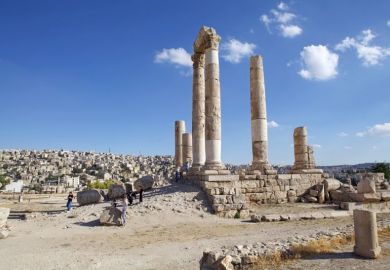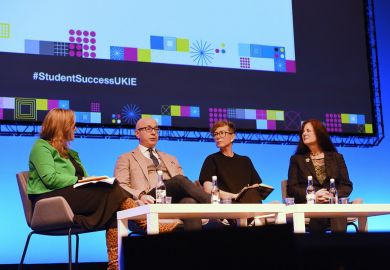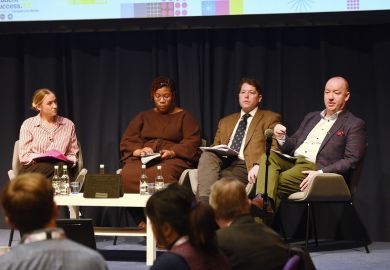Leaders from across the global higher education ecosystem will gather online on 1 and 2 September in an attempt to evaluate the true scale of disruption to the sector and set the strategic agenda for the next decade.
The initial programme of debate for this year’s Times Higher Education World Academic Summit has been published, with the intention to unite the academy on the theme “A new dawn for higher education?”
For the first time the annual event, which has become a fixture in the academic calendar for university presidents, will be open to attendees representing the full spectrum of higher education research, teaching, policy and management.
Speakers will address three core questions over the 48 hours: Is the pandemic and the shift to a more digitally-based world changing the value of “place” for higher education institutions, or entrenching it? Does this create a new opportunity for institutions in the Global South to redefine their public value and research impact, and challenge real or perceived power imbalances within international alliances, partnerships and scholarship programmes? Has the pandemic accelerated trends that were already clear and expected for higher education institutions or have we moved into uncharted territory?
Inclusion is the top priority for the forum and THE has constructed a virtual centre, which will allow attendees to collaborate and share ideas from across the world, at any time.
Phil Baty, THE’s chief knowledge officer, said: “These are profoundly unsettling times for the world – and the coronavirus pandemic has shaken universities to their core, shutting laboratories, locking down campuses, halting the global flow of talent and, for many, causing alarming, even existential, financial crises. But the resilience and innovation and spirit that many universities across the globe have demonstrated, in completely rethinking their core duties and in renewing their relationships with their communities and wider society, has been extraordinary – and inspirational.
“So at THE, we hope that this virtual summit will be a galvanising gathering, an opportunity for the global university community to regroup, compare notes, share best practice, and work in harmony to ensure a robust and resilient future for a sector that has been transformed by this crisis forever.”
The summit will also mark the launch of THE’s prestigious World University Rankings 2021, which will be analysed in a series of workshops.
Across four stages of content featuring a mixture of live panel debates with university presidents, interviews by THE’s editors, data masterclasses, workshops and round-table discussions, the two-day summit will examine this potential pivot point for universities on a global scale. The “World Stage” programme will begin with a discussion led by Dawn Freshwater, vice-chancellor of the University of Auckland, exploring whether the next decade will see a restriction in the internationalisation strategies of universities and a breakdown in global collaboration.
Debating the relevance of physical place in a world that is exponentially favouring digitised methods of teaching and learning, Nancy Rothwell, president of the University of Manchester, will lead a session with leaders from Bangladesh and Ethiopia scrutinising the current value of university location, once considered a vital organ for the community’s public health and knowledge economy.
THE’s editor, John Gill, will interview Michael Ignatieff, president of the Central European University, an institution that has been dealing with physical displacement since having to vacate their Hungarian premises after a government mandate in 2018. Drawing on the previous session’s conversation, and Professor Ignatieff’s personal experience, the discussion will revolve around the potentially liberating aspect of taking university practices off-campus.
Bringing her acute knowledge of administering clinical care in the public sector, Agnes Binagwaho, vice-chancellor of the University of Global Health Equity and former Minister of Health for the government of Rwanda, will examine how universities can support global cooperation in the race for a vaccine for Covid-19 but avoid the emerging global divides in the development and distribution of any breakthrough treatment.
The second day of the summit’s World Stage programme will begin with a panel discussion between Jean Chambaz, president of Sorbonne University; Teruo Fujii, executive vice-president of the University of Tokyo; Mamokgethi Phakeng, vice-chancellor of the University of Cape Town, and Michael Spence, vice-chancellor of the University of Sydney. The panel will debate the utility of established institutional “success” indicators in a decade that promises to be dominated by public demand for rapid impact from applied research and community engagement.
The 2021 THE World University Rankings will be published at 12pm BST on 2 September, with an exclusive 90-minute insight session and Q&A with THE’s chief data officer Duncan Ross and Elsevier’s vice-president of product management, funding and content analytics, M’hamed el Aisati.
Focusing on efforts across African countries to capitalise on new higher education models, Sarah Anyang Agbor, commissioner for human resources, science and technology at the African Union Commission, will contribute to a conversation with university presidents illustrating new concepts of “excellence” that can be used to catalyse sustainable growth across the continent.
The concluding debate on the World Stage will analyse whether the pandemic has created an opportunity to reduce structural inequalities in the global higher education ecosystem, and will include Meric Gertler, president of the University of Toronto, which will be the host partner of THE’s World Academic Summit in 2021.
Professor Gertler said: “At this extraordinary moment in time, higher education is busy reinventing itself. How will digitised modes of pedagogy transform the sector? Can remote learning address some of the entrenched inequalities associated with in-person education? Or will it simply introduce other new challenges? What have we lost in the pivot to virtual pedagogy, and what have we gained? And what remains of the attractive power of place, and its ability to convene and nurture creativity?
“I am looking forward to discussing these questions – and many more – at the virtual World Academic Summit this year. The summit will be a fascinating prelude to the 2021 World Academic Summit, on the Power of Place, next year in Toronto.”
Find out more and register for the virtual World Academic Summit on 1-2 September.
Register to continue
Why register?
- Registration is free and only takes a moment
- Once registered, you can read 3 articles a month
- Sign up for our newsletter
Subscribe
Or subscribe for unlimited access to:
- Unlimited access to news, views, insights & reviews
- Digital editions
- Digital access to THE’s university and college rankings analysis
Already registered or a current subscriber?




